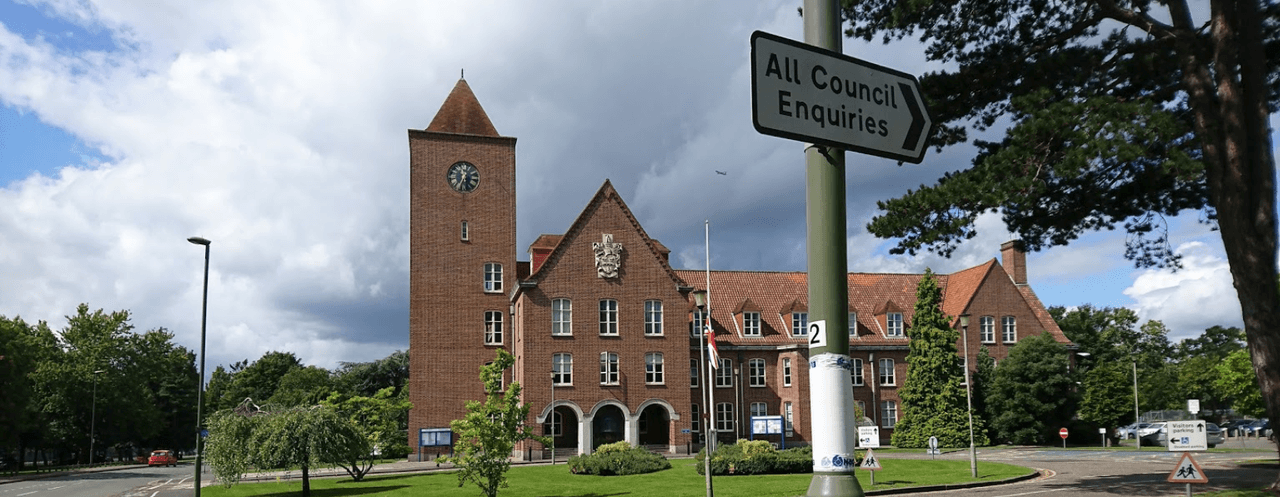
Spelthorne council leader who made billion-pound bet on property market ousted
The council leader behind a local authority’s £1bn property spree has lost power after being deposed at a meeting of his fellow Conservative councillors.
Ian Harvey was the driving force behind Spelthorne borough council’s unprecedented spending on office and retail space – fuelled entirely by borrowing – which led to the small authority in Surrey being publicly criticised at a recent parliamentary committee hearing. Last month the Treasury indicated it would ban local authorities from following its example and investing in commercial property.
Harvey and the council have repeatedly dismissed criticism of the policy but, at the local Conservative party’s annual general meeting on Monday evening, he was deposed as group leader amid increasing concern about the investments. The following day Harvey and five other Conservative councillors, including Harvey’s wife Helen, announced they had left the party to form the United Spelthorne Group.
The council’s financial strategy has resulted in Spelthorne becoming reliant on rental income to fund services, despite the £1bn in borrowing generating a net return of less than 1%.
A well-placed source told the Bureau that a “growing number of councillors had become more and more concerned about what was going on” and suggested a new leadership could launch an investigation into the investments.
In a series of stories over the past 18 months the Bureau has revealed how Spelthorne, under Harvey’s leadership, borrowed the equivalent of nearly 50 times its spending power from the Public Works Loan Board (PWLB) to amass a portfolio of office spaces in Surrey and the Thames Valley, as part of an attempt to become self-sufficient.
The scale of the council’s spending courted controversy. Last year the Bureau revealed that its auditors, KPMG, had found “significant weaknesses” in the £385m purchase of a BP research centre in Sunbury – the most expensive property investment ever made by a local authority. The auditor, which had initially refused to sign off the council’s accounts as a result, concluded that the council had not put in place “proper arrangements to secure economy, efficiency and effectiveness in its use of resources”.
After the Bureau’s initial report James Brokenshire, then the secretary of state for local government, said he “shared the concerns” about councils becoming overexposed to commercial investments and said he would discuss with the Treasury “whether further intervention might be required”. The following month a senior civil servant admitted the government was worried that “two or three” councils had borrowed too much.
In October, the Treasury increased the interest rate for a typical PWLB loan, which was seen as an attempt to discourage councils from following Spelthorne’s example. Last month, it went further, saying it wanted to end such investments. A Treasury spokesman said: “Our starting point is that local authorities should invest public money in regeneration, housing and delivering services, not in speculative commercial investments which can put local and national taxpayers at risk.”
Spelthorne, by its own admission, has become “heavily reliant on investment income” to fund services. Its property portfolio is predicted to bring in £9.9m this year, more than council tax and far in excess of business rates and government grants. However, that sum represents a return on investment of less than 1%, after taking into account interest, repayment costs and money set aside to maintain the buildings.
This has left the council with little margin for error just as the Covid-19 crisis severely compromised investments in office and retail space. Spelthorne spent a further £40m on a shopping centre just weeks before the lockdown. Some 90% of its stores are currently closed.
The council’s spending has led to public criticism from high-profile figures within the local government sector. In May, Rob Whiteman, the chief executive of Chartered Institute of Public Finance and Accountancy, told the Public Accounts Committee that Spelthorne had “borrowed too much”, adding that “you don’t have to be Accountant of the Year” to recognise it had taken on too much risk.
During a dramatic meeting on Monday, Harvey was challenged for the leadership by another councillor, John Boughtflower, over the investments and other concerns. The Bureau understands Harvey then removed himself from the running.
In a press release announcing his split from the Conservatives, Harvey said: “Our renowned investment strategies have re-invigorated Spelthorne finances.”
Harvey will remain council leader until a vote at a full council meeting. A council spokesperson said that the deadline for such a motion at the next meeting, on June 18, had passed. The loss of six councillors means the Conservatives no longer hold an overall majority for the first time in the council’s history.
Our reporting on local power is part of our Bureau Local project, which has many funders. None of our funders have any influence over the Bureau’s editorial decisions or output.
Header image: Spelthorne town hall. Credit: Daniel McKenzie




